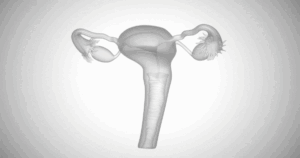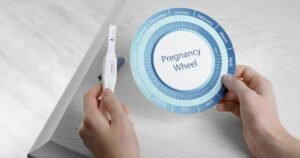Last Updated on 10 February 2024
UPDATED 07 FEBRUARY 2024
Empower your fertility journey and estimate your ovulation date.
Embarking on the journey of parenthood is an exciting and sometimes challenging experience. Understanding your ovulation cycle and the ability to estimate your ovulation date are crucial to starting a family. Ovulation plays a significant role in determining the most fertile days of a woman’s menstrual cycle. It usually occurs around the middle of the menstrual cycle, approximately 14 days before the start of the next period. However, every woman’s cycle is unique, and factors such as stress, illness, or lifestyle changes can affect the timing of ovulation. Fortunately, various methods exist to estimate your ovulation date, and you can do it here for free.
Menstrual Cycle Tracking
Understanding your menstrual cycle is fundamental when estimating your ovulation date. The average menstrual cycle is around 28 days, but it can vary from woman to woman. Tracking your cycle over a few months will give you a clearer picture of your pattern. You can track your menstrual cycle by noting the start and end dates of each period for a few months to identify the average length of your cycle.
Ovulation often occurs around the midpoint of the menstrual cycle. If your cycle is consistently 28 days, ovulation may occur around day 14. Remember, every woman’s body is unique, and what works for one may not work for another. Combining multiple methods or consulting with a healthcare professional can provide a more accurate estimate of your ovulation date.

The Reproductive System
If you have received a positive pregnancy test, congratulations! You can estimate your due date for free. Our pregnancy due date calculator provides helpful information about your pregnancy. The information includes your estimated due date, when you likely conceived, how far along you are, and the best time for nuchal and morphology scans. This valuable tool will help you plan and prepare for the next exciting chapter of your life.
Stay up-to-date on the latest parenting tips, fertility insights, and valuable resources by subscribing to our newsletter. Your privacy is our priority, and your information is treated with the utmost confidentiality. Check out our privacy policy for more details, or contact us if you have any questions.
Empower yourself with knowledge and take charge of your fertility journey. Understanding and estimating your ovulation date is a crucial step towards parenthood. By utilizing our resources, you can confidently increase your chances of conception and navigate the exciting path of pregnancy and parenting. Remember, trying to conceive is a unique journey for every individual, and we are here to support you every step of the way. Subscribe, stay informed, and embrace the incredible experience of becoming a parent.
Frequently Asked Questions
How do I estimate my ovulation date?
You can estimate your ovulation date by tracking your menstrual cycle, using ovulation prediction kits (OPKs), monitoring basal body temperature (BBT), observing changes in cervical mucus, or utilizing fertility apps that analyze your cycle patterns.
What is the average length of a menstrual cycle?
The average menstrual cycle is around 28 days but can range from 21 to 35 days. Tracking your cycle over a few months will help determine your pattern.
Are fertility apps reliable for estimating ovulation dates?
Yes, many fertility apps use advanced algorithms and user input to predict ovulation dates. However, it is essential to complement app predictions with other methods for increased accuracy.
Can stress affect ovulation dates?
Yes, stress can impact your menstrual cycle and potentially delay or disrupt ovulation. Maintaining a healthy lifestyle, including managing stress, can positively influence fertility.
Do ovulation prediction kits (OPKs) guarantee accuracy?
While OPKs are generally reliable, they may not be foolproof. Factors like irregular cycles and certain medications can influence their accuracy. It is recommended to use them alongside other tracking methods.
Is cervical mucus analysis a reliable method for estimating ovulation?
Yes, monitoring changes in cervical mucus can be a reliable indicator of ovulation. The mucus becomes clearer, stretchy, and slippery as you approach ovulation.
Can I estimate ovulation dates if I have irregular periods?
Yes, it is possible. Tracking your cycles over a few months will help identify patterns even with irregular periods. Fertility apps and other methods like BBT tracking can be beneficial in such cases.
How long before ovulation should I engage in intercourse for conception?
The fertile window typically includes the day of ovulation and the five days preceding. Having intercourse during this timeframe maximizes the chances of conception.
Can certain health conditions affect ovulation?
Yes, conditions like polycystic ovary syndrome (PCOS) or thyroid disorders can impact ovulation. Consulting with a healthcare professional is crucial for tailored advice.
Are there lifestyle changes that can positively influence ovulation?
Yes, maintaining a healthy lifestyle with regular exercise, a balanced diet, and adequate sleep can positively impact ovulation. Avoiding excessive stress and managing weight can also contribute to optimal fertility.
Can birth control pills affect my ability to estimate ovulation dates?
Yes, discontinuing birth control pills can temporarily impact your menstrual cycle. It may take a few cycles for your body to regulate, and estimating ovulation dates may be less accurate during this time.
Is it possible to estimate ovulation if I have recently given birth or breastfeeding?
Yes. However, breastfeeding can suppress ovulation, making cycle tracking less predictable. It is advisable to use additional methods like monitoring cervical mucus or BBT for a more accurate estimation.
How can age affect ovulation and fertility?
As women age, the quantity and quality of eggs decline, making conception more challenging. Ovulation may become irregular, emphasizing the importance of timely tracking methods.
Can travel and changes in time zones affect ovulation?
Travel and time zone changes can disrupt your menstrual cycle temporarily. Considering these factors when estimating ovulation dates and planning conception is advisable.
Are there signs or symptoms that can indicate ovulation is imminent?
Yes, some women may experience mild pelvic pain (mittelschmerz) or heightened sexual desire around ovulation. Tracking these symptoms alongside other methods can enhance accuracy.
Can excessive exercise impact ovulation?
Intense or excessive exercise can potentially affect ovulation. Striking a balance with moderate physical activity supports overall reproductive health.
How soon after stopping contraception can I estimate my ovulation date?
The time it takes for your cycle to regulate after stopping contraception varies. Tracking your cycle for a few months is recommended to establish a more accurate ovulation estimate.
Can certain medications interfere with ovulation?
Some medications, including certain antidepressants and antipsychotics, can impact ovulation. Consult with your healthcare provider if you have concerns about medication affecting your fertility.
Is it possible to estimate ovulation dates without using any tracking tools?
Yes. You can estimate ovulation dates by paying attention to your body’s natural signs, such as changes in cervical mucus and basal body temperature. However, using additional tracking tools can enhance accuracy.
Author Biography









